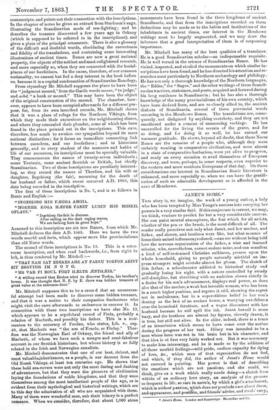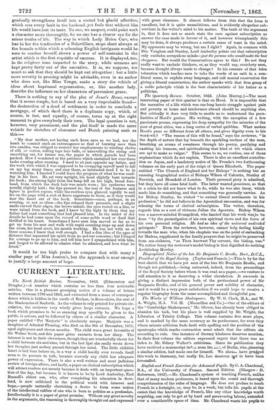JANET'S HOME.* Tuts story is, we imagine, the work of
a young author, a lady who has been tempted by Miss Yonge's success into essaying her powers in a very similar field. If this conjecture is correct, we may, we think, venture to predict for her a very considerable success. She can paint mental atmosphere, the feat which for all artists, whether of the pen or the brush, is the most difficult of all. The reader really perceives not only what Janet, and her mother, and father, and sisters, and brothers were like, but what manner of home their united influences produced,--can see without being told how the nervous organization of the father, a wise and learned scholar, who, nevertheless, cannot endure noise, and can manifest a kind of self-restrained Christian sulkiness, presses upon the whole household, giving to people naturally mirthful an im- press strangers might mistake almost for gloom. The sketch of this father, a schoolmaster addicted to historical study and gradually losing his sight, with a nature controlled by steady self-discipline, but throbbing with an ambition shown chiefly in a desire for his son's advancement, displays real power, as does
also that of the mother, a weak but loveable woman, who has been in a much higher position, and regrets it still, showing the regret
not in melodrama, but in a superstitious belief in her son's destiny as the last of an ancient house, a worrying carefulness over the household furniture, and a vague discontent with her
husband because be will spill the ink. Janet herself is more
hazy, and the brothers are almost lay figures, cleverly drawn, it is true, but still not alive. In the elder, indeed, there is a trace of an irresolution which seems to have come over the author during the progress of her task. Hilary was intended to be a man whose force was not in his brain but in his character, and that idea is at first very fairly worked out. But it was necessary to make him interesting, and he is made so by the addition of all those morbid feelings—wild pride, endless capacity for dying of love, &c., which men of that organization do not feel,
and which, if they did, the author of Janet's Home would not succeed in painting. Her power is that of describing the emotions which are not passions, and she could, we think, give us a work which really needs doing—a sketch from within of an ordinary love story, an analysis of the process so frequent in life, so rare in novels, by which a girl's attachment, which is without passion, 'which does not preclude care about dress, and appearance, and position, and friends' advice, and rivals' envy, • lands Home. London and Cambridge : Macmillan and Co. gradually strengthens itself into a rooted but placid affection, which sees every fault in the husband, yet feels that without him -life would have]ost its taste. No one, we suspect, could paint such a character more thoroughly, for no one has a clearer eye for the minor truths of life. The way in which Lady Helen Can•, who has in her the tendencies of a Brinvilliers, stops short always at the bounds within which a scheming English intrigante would be sure to confine herself, shows a power of self-restraint in the artist which is the first requisite of success. It is displayed, too, in the religious tone imparted to the story, while sermons are kept pretty fairly out of the narrative. It is, we suppose, too much to ask that they should be kept out altogether ; but a little more severity in pruning might be advisable, even in an author who does not, like Miss Yonge, make a story the vehicle of ideas about baptismal regeneration, or, like another lady, describe the influence on her characters of prevenient grace.
There is nothing to say of the plot of Janet's Home, except that it seems simple, but is based on a very improbable fraud— the destruction of a deed of settlement in order to conclude a mortgage, of which deed there is a duplicate copy, which, of
course, is lost, and equally, of course, turns up at the right moment to give everybody their own. The legal question is not,
however, very prominent, and the plot itself is made the mere vehicle for sketches of character and Dutch painting such as this:- " My dear mother, not having such keen eyes as we had, nor the heart to commit such an extravagance as that of burning more than two candles, was obliged to restrict her employments to winding skeins of silk or cotton, rolling tape into balls, or unravelling the string and smoothing out, for future use, the paper in which parcels had been packed. How I wondered at the patience which sustained her over these tasks evening after evening. I used to sit just opposite my father, and the work with which I was supposed to be occupying myself used to fall on my lap many times and stay there, so interested used I to be in watching him. I fancied I could trace the progress of what he was read- ing in his face. He sat very upright, his head slightly bent towards his book ; the strong light from the lamp fell on his high, broad fore- head, from which the dark hair was much worn ; his eyebrows were usually slightly knit ; the lips pressed in; the rest of the features and figure in perfect repose, while the restless eyes glanced rapidly to and fro on the page with a sort of fierce eagerness in them, as if they would tear the heart out of the book. Sometimes—once, perhaps, in an evening, or not so often—the lips relaxed their pressure, and a slight smile curved their edges, the brows unknit, the eyes rested on a line, or were raised from the book, and I knew by the light in them that my father had read something that had pleased him. In the midst of dry details he bad come upon the record of some noble word or deed that thrilled to his heart. Sometimes I have seen him moved so far as to get up from his seat and walk with rapid sounding steps up and down the room, his head erect, his mouth working. He was not with us at these seasons, I knew that well enough. I had a dim idea of the ages of distance that separated his spirit from us and our concerns ; but I longed for courage to go up to him, and tell him how I sympathized with him, and longed to be allowed to admire what he admired, and love what he loved."
It would be too high praise to compare that with many a similar page of Miss Austen's, but the approach is near enough to justify a large amount of hope.































 Previous page
Previous page